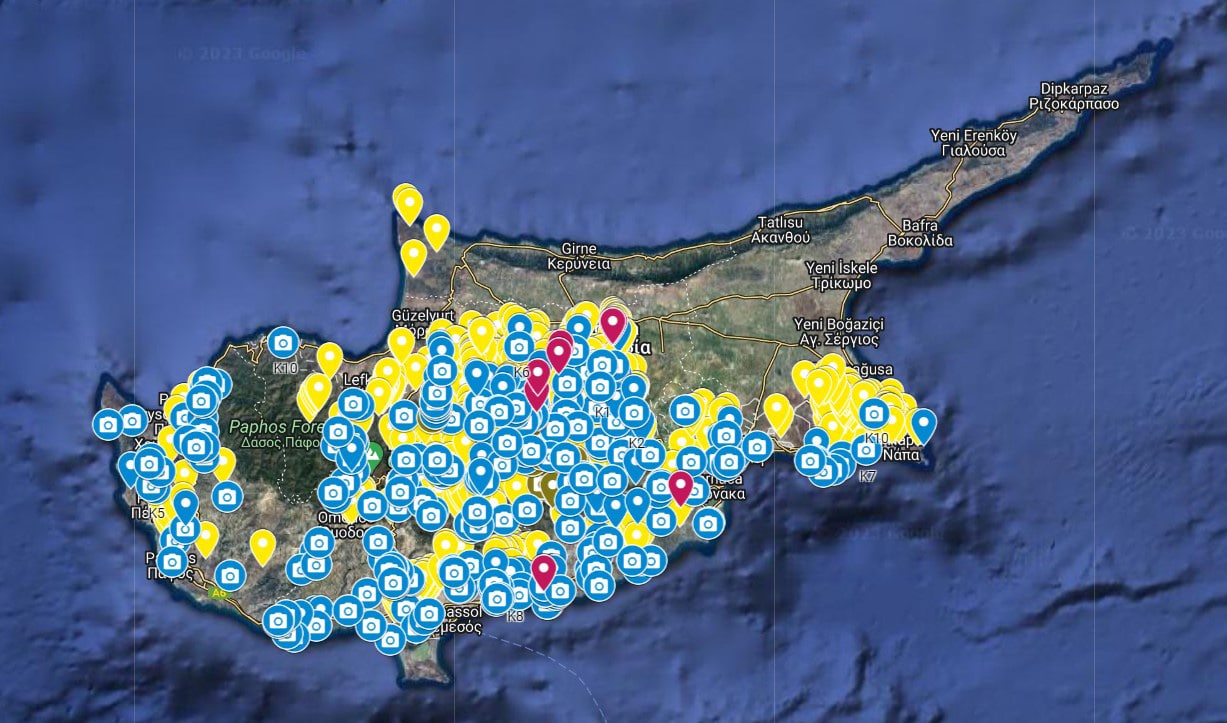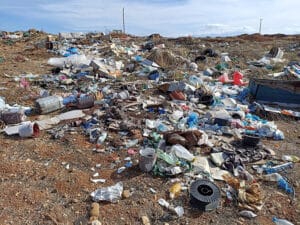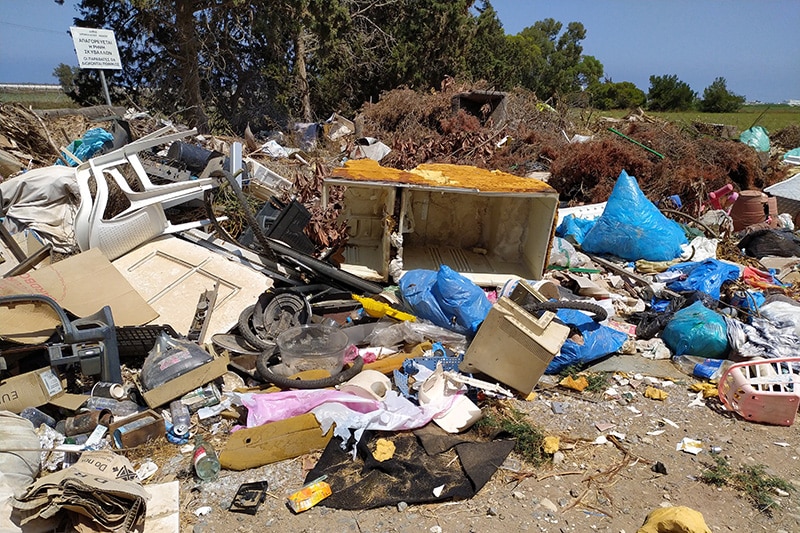A new map of the island shows it drowning in illegal tipping sites. ALIX NORMAN speaks to its creator, and finds the entire country is being poisoned
In terms of waste generation, Cyprus ranks 7th in Europe: every islander produces 609 kilos of rubbish per year, well above the continental average of 517 kilos.
The good news is that we’ve actually managed to decrease our wasteful habits: a decade ago, Cyprus was in third position (just behind Denmark and Switzerland). But the Very Bad News is that this rubbish is mounting too rapidly to be dealt with. In effect, Cyprus is becoming the island not of love, but of trash.
Various municipalities are attempting to address the issue, most notably Aglangia, which has pioneered the EU’s pay-as-you-throw initiative. Lifting the annual waste management charge, the municipality now requires residents to purchase specific bags (at a cost of €2 each) to dispose of non-recyclable trash. In theory, it’s a great idea. In practice, it’s not working: almost 20 per cent of municipality residents have already been contacted for failure to comply; thousands more have resorted to fly-tipping their trash; and the mayor has gone on record stating that people “do not respect the place they live in.”
“This,” says Andreas Yiannaki, “is an indicator of the problem. We live in what was once a Mediterranean paradise: a place whose scenery draws visitors in their millions. And yet, each year, our landscapes and seascapes are being desecrated by trash – everywhere you go there seems to be an unofficial, illegal dump.”

the interactive google map showing illegal rubbish dumps across Cyprus
Andreas is stating fact; data that has been painstakingly gathered over the past few years. The admin of Facebook page ‘Garbage Island, Cyprus’ encourages concerned citizens to post photos and locations of illegal dumping grounds, and Andreas has recently released a shocking Google Maps link.
“I’ve only been recording fly-tipping sites for three years,” he reveals. “And already, I have concrete data on more than 1,000 illegal dumping sites across the island. Not one region of Cyprus has escaped.”
From clifftops to river gorges, inaccessible beaches to isolated forest, the island has become one big rubbish dump, he mourns. “I’ve recorded fly-tipping sites a minute’s drive from main roads; just outside villages; in far-flung valleys where you think nobody goes. These aren’t just a few bags of rubbish – they’re full-on dumping grounds that are chock-full with years of trash; everything from fridges to furniture to food waste.
“This rubbish is rusting into the ground, melting in the heat, turning into toxic dust that’s leaching chemicals into the ground and groundwater. It’s like a horrific dystopian documentary,” he adds, “something you’d see on the National Geographic channel.”
As an outdoors enthusiast who enjoys swimming, climbing and hiking, 35-year-old Andreas is deeply saddened by the extent of the problem. “If you’re not looking, it’s easy to not see,” he admits. “But if you open your eyes, you’ll find this problem is endemic. Last summer, I charted Akamas – a protected area that you think would be free of rubbish. Instead, I found beautiful beaches littered with piles of plastic; hidden vales inundated with trash. In almost inaccessible mountain regions, it’s the same story: heaps of bottles, coffee cups, and gun cartridges littering the paths and the forests.

Near Paliometocho
“I don’t want to blame any one group,” he adds. “Those who visit these places are just one small part of a much bigger problem, and I believe the solution begins with education – we need to change our mindset. Do people realise they’re poisoning their island and themselves?
“Outside Klirou, for example, there’s a huge, illegal dumping site in the middle of an agricultural region. The produce that is grown in these fields ends up in the grocery aisles of your supermarket. And yet the thousands of tonnes of waste is leaching toxins and chemicals into the ground. How many people have to turn a blind eye before something is done?”
As part of his extensive research, Andreas has reached out to government authorities, municipal officials and even the EU. “It’s not enough to document this tragedy,” he acknowledges. “Something must be done. Neither I nor the many local volunteer groups are making a dent; this mountain of rubbish just keeps on coming!
“I’ve found that change can happen,” he adds. “But for the most part, it’s too little too late. The worst site I’ve ever seen is in the Serrachis river valley close to Palaichori; once one of the island’s most beautiful areas. Now, there’s a trash mountain right next to the road and opposite a public hiking trail: rubbish piled up in the river, its banks, the surrounding trees.
“I photographed this garbage, contacted authorities. As a result, the Commissioner of the Environment personally visited the site; a roadside rail was erected to prevent easy access. But the locals have used this site for years, and the rubbish just keeps on coming.”
Visiting dumping sites shared by the Facebook group’s members (who are asked to include photos and GPS co-ordinates of any fly-tipping they encounter), personally seeking out (and attempting to clear) sites himself, and even using satellite imagery to determine where rubbish is being illegally dumped, Andreas is doing sterling work. But “I’m just one person, running just one group,” he acknowledges. “This is a problem that requires everyone, from the general public to the highest levels of government, to change the status quo.
“The authorities are definitely aware of this massive problem,” he notes. “Recently, parliament earmarked €1 million for illegal rubbish dump clean ups. I laughed when I heard. This was lauded as a serious effort, but it’s not even enough to clear the Palaichori site. I know it’s hard to find the money to fix every problem. But this issue is not going away: the longer you wait, the worse it gets.
“Meanwhile, the rubbish just keeps on coming. The most recent statistic suggests Cyprus is drowning in in 570,000 tonnes of trash produced each year, every year. That’s the weight of 10 Titanics, but doesn’t account for the illegal dumping. If we don’t start changing our ways, will our once-beautiful island begin sink under its own trash?”
For more information, visit the Facebook page ‘Σκουπιδότοποι της Κύπρου / Garbage island, Cyprus’ or the interactive Google Map ‘ILLEGAL GARBAGE DUMPS’







Click here to change your cookie preferences